Israel-Hamas War Day 131: What happened in Gaza?
Netanyahu to Biden: I want a hostage deal, but Hamas's demands are a non-starter • US 'working intensely on Gaza hostage deal' as Israeli delegation leaves Cairo


IDF announces name of soldier killed in Hezbollah attack

The IDF named Staff-Sergeant Omer Sarah Benjo as the soldier killed by an earlier Hezbollah rocket attack on northern Israel on Wednesday.
Benjo was 20 years old from the town of Ge'a. She served in the 869th Battalion.
The IDF raised her rank to Staff-Sergeant posthumously. Her family has been notified.
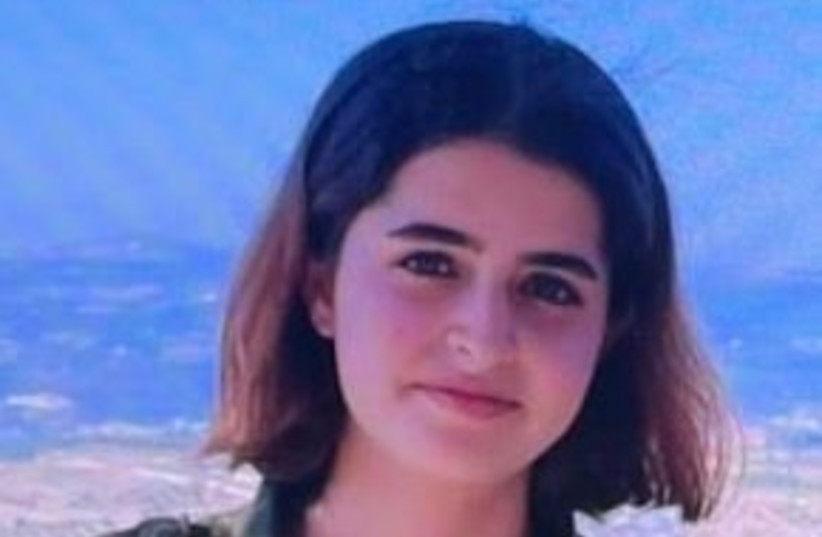
Biden to defer enforced departure for Palestinians due to conditions in Palestinian territories
"While I remain focused on improving the humanitarian situation, many civilians remain in danger; therefore, I am directing the deferral of removal of certain Palestinians who are present in the US."
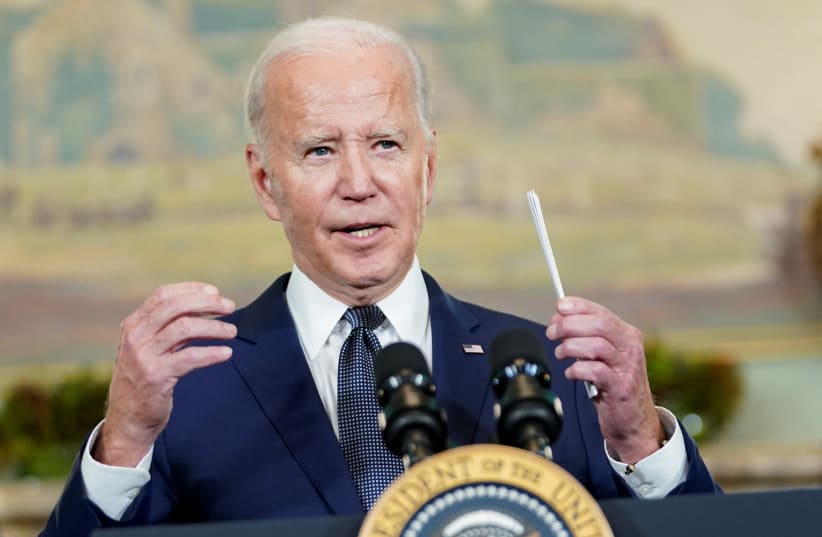
The White House issued a memo on Wednesday to defer enforced departure for certain Palestinians for 18 months given the humanitarian and military conditions in the Palestinian territories.
"Following the horrific October 7, 2023, terrorist attack by Hamas against Israel, and Israel's ensuing military response, humanitarian conditions in the Palestinian territories, and primarily Gaza, have significantly deteriorated," according to a statement from President Joe Biden.
"While I remain focused on improving the humanitarian situation, many civilians remain in danger; therefore, I am directing the deferral of removal of certain Palestinians who are present in the United States," the statement said.
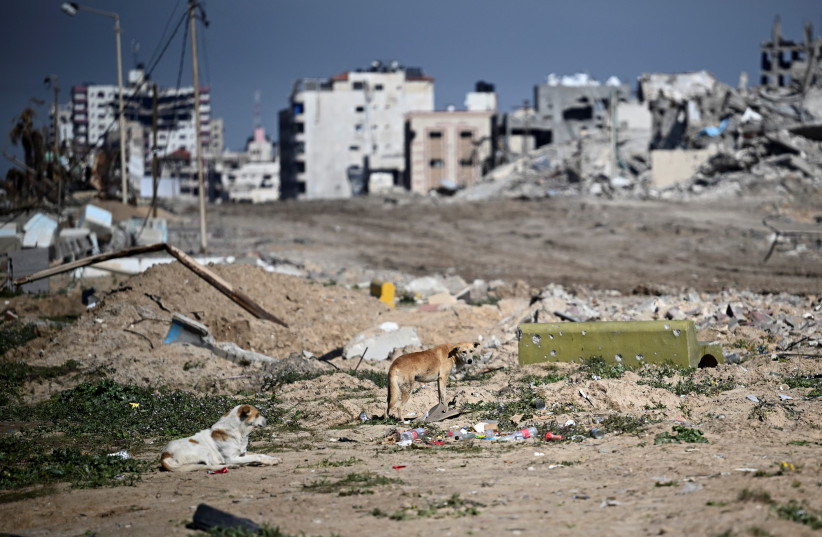
Who is exempted?
Exempted are Palestinians who did not reside in the US prior to February 14, those convicted of a felony or two or more misdemeanors committed in the US, and those subjected to extradition, among other conditions.
The memo directs the Secretary of Homeland Security to take measures to authorize employment for noncitizens whose removal has been deferred, and to consider suspending regulatory requirements to F-1 nonimmigrant Palestinian students.
Go to the full article >>Roundtable on Hamas use of sexual violence held on Capitol Hill
Congress is expected to vote on a resolution "Condemning rape and sexual violence committed by Hamas in its war against Israel."
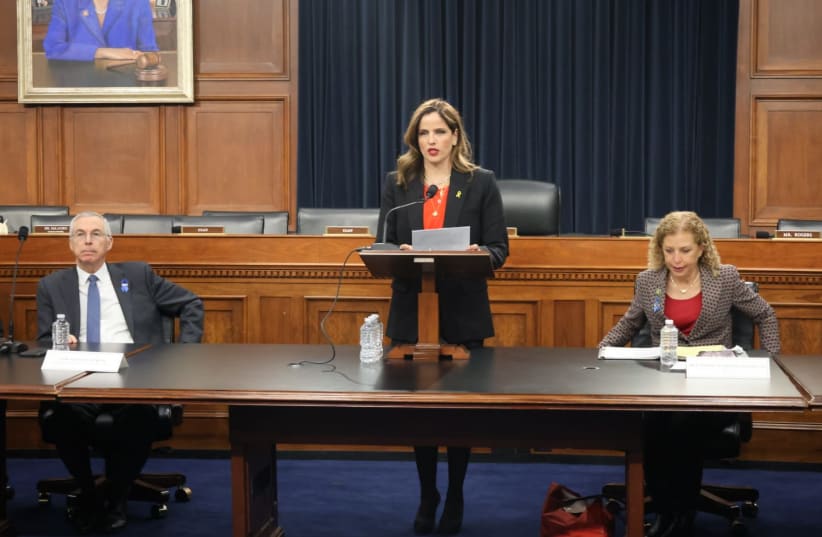
Rep. Debbie Wasserman-Shultz hosted a roundtable discussion on Wednesday to raise awareness about the sexual and gender-based violence Hamas perpetrated on Oct. 7 along with Second Gentleman Doug Emhoff, Israeli Ambassador to the US Michael Herzog and Special Envoy to Monitor and Combat Antisemitism Ambassador Deborah E. Lipstadt.
Wasserman-Shultz was nearly in tears as she began the program. Earlier Wednesday, Wasserman-Shultz said she met with Israeli law enforcement to hear about the ongoing investigation into Hamas and its use of sexual violence.
"I have never seen more sadistic evil perpetrated against another human than in the photos and videos that we saw earlier this morning," Wasserman-Shultz said.
Wasserman-Shultz said the evidence of sexual violence is "abundant and beyond compelling."
Through survivors coming forward, witnesses, video footage and independent analysis, we know that Hamas' use of sexual violence including rape, mutilation and brutality was not an anomaly, according to Wasserman-Shultz.
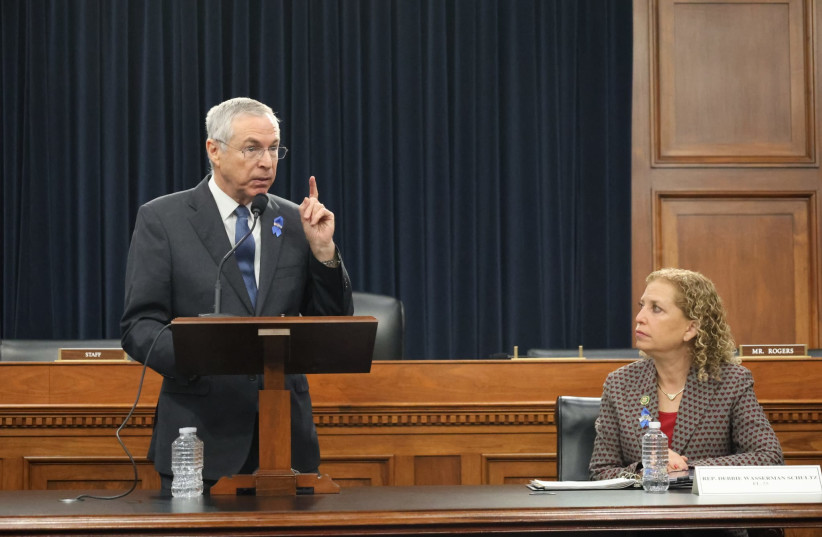
"It was a premediated part of their strategy to purposefully use sexual violence as a weapon against innocent civillians," she said.
Skepticism about Israeli survivors 'unacceptable'
Wasserman-Shultz said when Israelis bravely came forward to share the horrors they experienced or witnessed, there was silence or categorical dismissal of their stories. They were questioned, accused of being part of a PR campaign, doxxed, and threatened on social media, Wasserman-Shultz said.
“It’s unacceptable that skepticism still follows survivors, and unconscionable that hate and bias are driving people to ‘believe only some women.’ We cannot equivocate. We cannot let this revolting ideology create a permission structure for premeditated and intentional rape, “ Wasserman Schultz said. “And we cannot give an inch to those who would overlook sexual violence specifically against Jews, because they are the heirs to the darkest moments in our history. Today we helped lift that silence and confronted the hate that feeds it.”
Emhoff said there can not be silence when Jewish women experience sexual violence; Jewish women must be believed and their stories must be elevated. The hate, barbarism, and terrorism must be acknowledged, he said.
"The discrediting of accounts is simply a failure of justice. Sexual violence, mutilation, torture, butchering is not an inevitably byproduct of war," Emhoff said.
While it may be difficult to bear witness to these atrocities, Herzog said we must not allow Hamas’ violence against women to go unnoticed.
"When so many have been unwilling to believe Israeli women, the evidence shows their hypocrisy," Herzog said.
The roundtable discussion Wednesday came as Congress is expected to vote on a resolution "Condemning rape and sexual violence committed by Hamas in its war against Israel."
According to the resolution, the House condemns all rape and forms of sexual violence as weapons of war, including those acts committed by Hamas terrorists on and since Oct. 7.
The resolution also calls on all nations to criminalize rape and sexual assault and hold accountable all perpetrators of sexual violence, including state and non-state armed groups.
The resolution reaffirms the US government’s support for independent, impartial investigations of rape and sexual violence committed by Hamas on and since Oct. 7 and reaffirms its commitment to supporting survivors of rape and sexual violence, including those brutalized on and since Oct. 7.
Rep. Lois Frankel (D-FL) introduced the bill which has 200 cosponsors.
Go to the full article >>Netanyahu doubles down on Rafah op, Abbas asks Hamas to close hostage deal
In an unusual move, Palestinian Authority President Mahmoud Abbas called on Hamas to soften its demands, because a hostage deal was likely to prevent an IDF operation in Gaza.
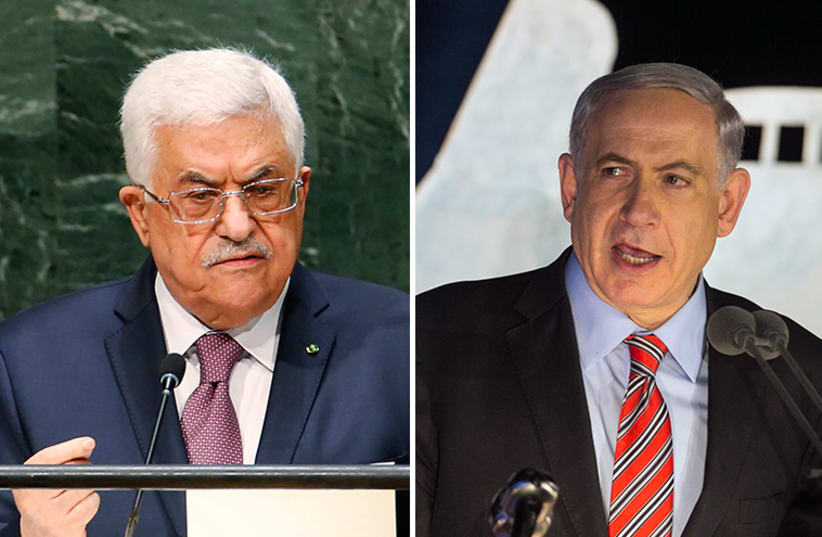
Prime Minister Benjamin Netanyahu insisted that he planned to move forward with a military operation in Gaza’s Rafah, as Palestinian Authority President Mahmoud Abbas called on Hamas to finalize a hostage deal with Israel to prevent such action.
“We will fight until complete victory with a powerful action, including in Rafah after we allow the civilian population to leave the combat zone,” Netanyahu wrote in a post on X.
He spoke out amid strong international condemnation of any potential operation in Rafah, which is near the Egyptian border.
Netanyahu has promised that he would move forward only once a plan to protect civilians in Rafah had been completed.
International concern, however, is high for the fate of over 1.3 million Palestinians in Rafah, many of whom fled there to escape bombings in the northern part of the enclave.
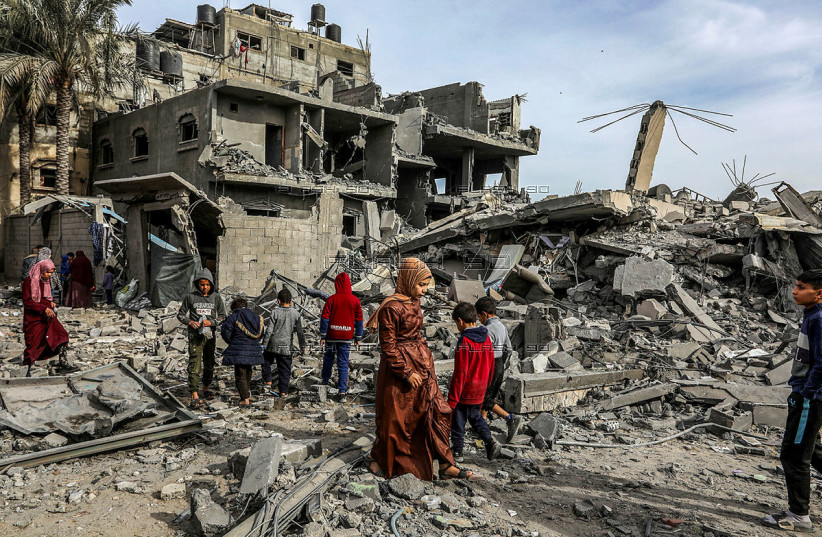
The possibility of an IDF operation in Rafah, an area considered to be the last Hamas stronghold, has also become a pressure lever to force the terror group to make a hostage deal with Israel.
In an unusual move, Palestinian Authority President Mahmoud Abbas called on Hamas to soften its demands because a hostage deal was likely to prevent an IDF operation in Gaza.
“We call on everyone, especially the Hamas movement, to quickly complete the [hostage] deal so that we can protect our people and remove all obstacles,” Abbas said, according to the Palestine News Agency, WAFA.
“We hold everyone responsible for placing any obstacles from any party to disrupt the deal because things are no longer tolerable, and it is time for everyone to bear responsibility,” Abbas said.
Abbas urges Hamas
Abbas urged Hamas to “spare Palestinian people the scourge of another catastrophe with ominous consequences, no less dangerous than the Nakba of 1948, and to avoid the occupation’s attack on the city of Rafah, which will lead to thousands of victims, suffering, and displacement for our people.”
US National Security Advisor Jake Sullivan told reporters in Washington that Abbas’s comments were unusual and that more leaders should call Hamas to task.
“Some of the international community’s pressure should be on Hamas, and Abbas coming forward today to do that has been unusual,” Sullivan said.
German Foreign Minister Annalena Baerbock who is visiting Israel spoke of her opposition to an Israeli military operation in Gaza when she spoke with reporters in Jerusalem.
Baerbock said: "1.3 million people are waiting there in a very small space. They don't really have anywhere else to go right now ... If the Israeli army were to launch an offensive on Rafah under these conditions, it would be a humanitarian catastrophe.”
French President Emmanuel Macron's office said in a statement that Macron, in a phone call with Netanyahu, had expressed his firm opposition to a possible Israeli military offensive in Rafah.
"This could only lead to a humanitarian catastrophe of a new magnitude and to forced displacement of populations, which would constitute violations of international human rights and bring additional risk of regional escalation," it said.
Reuters contributed to this report.
Go to the full article >>White House: All parties must try for hostage deal
Netanyahu says not sending delegation back to Cairo for talks.
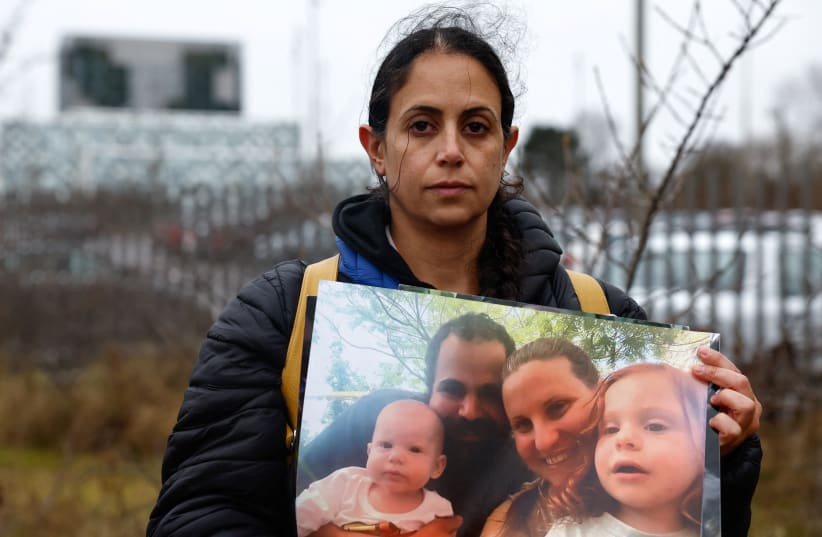
The White House urged “everyone, including Israel,” to do everything possible to reach a deal for the release of the hostages amid reports that Prime Minister Benjamin Netanyahu did not approve of sending a delegation back to Cairo for further negotiations.
“The direction of travel has to be everyone doing everything they can, including the government of Israel, to try and reach a deal that is good for Israel and that is good for regional security,” US National Security Adviser Jake Sullivan told reporters in Washington on Wednesday.
“The US is going to keep pushing hard on this privately with the Israeli government and publicly from this podium,” Sullivan said.
He spoke following a week of high tension between Netanyahu and US President Joe Biden, with NBC reporting that the American president had called the Israeli leader an “asshole.”
Some of the pundits have speculated that tensions have been fueled by a disagreement between the two about the hostage deal.
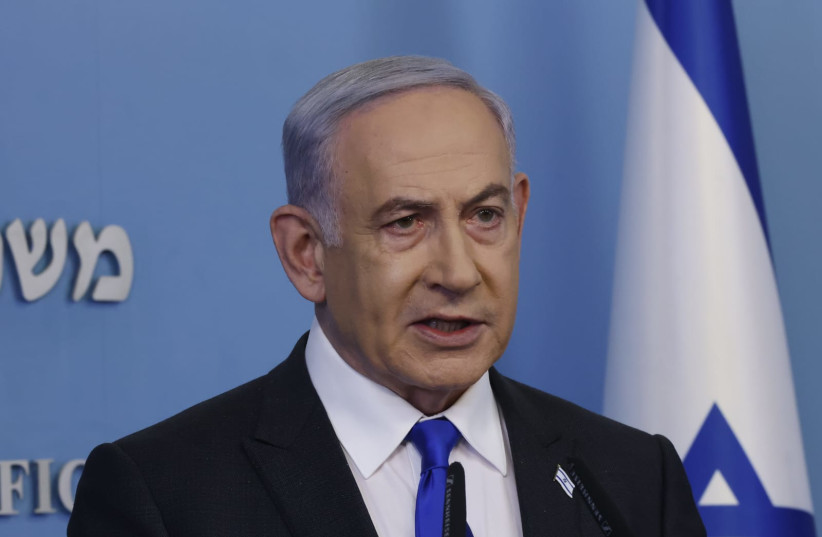
Netanyahu wants to complete a deal to free the remaining 134 hostages held in Gaza since October 7, but he has been clear that he will not do so at any price.
Biden has said that Hamas’s demands for a deal were “over the top.” State Department spokesperson Matthew Miller repeated that sentiment while speaking with reporters on Wednesday, noting that some of Hamas’s demands were “obvious non-starters,” such as the one about the Al-Aksa Mosque compound. It is located on Jerusalem’s Temple Mount and is known to Muslims as Haram al-Sharif.
Miller noted that the status of that site “is not going to be resolved in a negotiation.”
But Biden has also pressed Netanyahu to find a way to be more flexible, including during a conversation the two men held on Sunday.
Sullivan said on Wednesday that during that call, Biden had “strongly advocated for moving forward to get this deal done and to capitalize on the progress that we have seen.”
He explained that Biden “will continue to do that. We will continue to stand up for the need for a hostage deal to get those innocent people home and to get a sustained pause that will move a lot of humanitarian assistance in.”
On Tuesday night, an Israeli delegation that included Mossad director David Barnea, Shin Bet director Ronen Bar, and Ophir Falk, Netanyahu’s foreign policy adviser, returned from talks in Cairo with CIA director William Burns. IDF Maj. Gen. Nitzan Alon, who has been a critical player in the talks, did not join them.
Burns had also met with the Qataris and the Egyptians, the two countries that are mediating the talks.
Burn held a meeting in Paris at the end of January, which led to an agreement between the US, Egypt, Qatar, and Israel about the principled framework for an agreement.
According to Kan News, Netanyahu had rejected a new proposal for a deal drawn up by Barnea, Bar, and Alon, giving the delegation that went only a limited sphere of possible action.
After they returned on Tuesday night, Netanyahu decided not to send them back, and according to reports, he did not inform his war cabinet or seek its consent.
Deal details not made public
The details of a potential deal have not formally been made public, but they are widely believed to be a three-phased deal that includes a prolonged pause to the war, just as the IDF is preparing for a military operation in Rafah, which is believed to be Hamas’s last stronghold in Gaza.
IDF Chief of Staff Herzi Halevi told the cabinet this week that he opposed a pause in the fighting, warning that it could extend the war by years and that otherwise, it could be over in months, according to Kan.
It’s expected that the deal would also involve a demand that Israel release Palestinian security prisoners held in its jails, including terrorists with “blood on their hands,” Halevi said.
Hamas has insisted on a permanent ceasefire and a full IDF withdrawal from Gaza.
Netanyahu has rejected those demands, explaining that Israel must be allowed to finish its military campaign to destroy Hamas and retain security control over Gaza.
The Prime Minister’s Office said on Wednesday night that Netanyahu has insisted that “Israel will not give in to Hamas’s delusional demands.”
“Israel did not receive in Cairo any new proposal from Hamas on the release of our hostages,” the PMO said, adding that what is needed is a “change in Hamas’s positions [that] will allow the negotiations to advance.”
Netanyahu then released a personal message touting his record in securing the release of 112 out of the 253 hostages seized in the Hamas-led attack on Oct. 7; 109 of those captives had been released through agreements with Hamas, but three were freed through IDF military operations.
“As of now, we have freed 112 of our hostages in a combination of strong military pressure and tough negotiations,” he said.
“This is also the key to freeing more of our hostages: strong military pressure and very tough negotiations.
“Indeed, I insist that Hamas drop its delusional demands. When they do so, we will be able to move forward,” Netanyahu stressed.
Hostage and Missing Families Forum spokesperson Haim Rubenstein said, “The families of the hostages were stunned by the decision to thwart the Cairo negotiations.”
“It appears that some members of the cabinet decided to sacrifice the lives of the abductees without admitting it,” Rubinstein said.
Netanyahu separately insisted that he planned to move forward with a military operation in Rafah, but only after he had drawn up a plan to protect the over 1.3 million Palestinians in that area by the Egyptian border. Many of them fled there to escape bombing in the north of the enclave.
“We will fight until complete victory with a powerful action, including in Rafah after we allow the civilian population to leave the combat zone,” Netanyahu wrote on X.
He spoke out amid strong international condemnation of any potential operation in Rafah.
The possibility of an IDF operation in Rafah has become a pressure lever to force the terror group to make a hostage deal with Israel.
In an unusual move, Palestinian Authority President Mahmoud Abbas called on Hamas to soften its demands, because a hostage deal was likely to prevent an IDF operation in Gaza.
“We call on everyone, especially the Hamas movement, to quickly complete the [hostage] deal so that we can protect our people and remove all obstacles,” Abbas said according to the Palestine News Agency, WAFA.
“We hold everyone responsible for placing any obstacles from any party to disrupt the deal because things are no longer tolerable, and it is time for everyone to bear responsibility,” Abbas said.
Abbas urged Hamas to “spare Palestinian people the scourge of another catastrophe with ominous consequences, no less dangerous than the Nakba of 1948, and to avoid the occupation’s attack on Rafah, which will lead to thousands of victims, suffering, and displacement for our people.”
Sullivan told reporters in Washington that Abbas’s comments were unusual and that more leaders should call Hamas to task.
“Some of the international community’s pressure should be on Hamas, and Abbas coming forward today to do that has been unusual,” Sullivan said.
German Foreign Minister Annalena Baerbock, who is visiting Israel, spoke of her opposition to a Rafah military operation at a news conference in Jerusalem. She said that “1.3 million people are waiting there in a very small space. They don’t really have anywhere else to go right now ... If the Israeli army were to launch an offensive on Rafah under these conditions, it would be a humanitarian catastrophe.”
French President Emmanuel Macron’s office said in a statement that Macron, in a phone call with Netanyahu, had expressed his firm opposition to a possible Israeli military offensive in Rafah.
“This could only lead to a humanitarian catastrophe of a new magnitude and to forced displacement of populations, which would constitute violations of international human rights and bring additional risk of regional escalation,” it said.
Reuters contributed to this report.
Go to the full article >>Unilateral recognition of Palestinian state will perpetuate conflict, Sa’ar says
In his speech, Sa’ar stressed the link between Hamas’s extreme Islamist ideology and the outbreak of antisemitism worldwide.
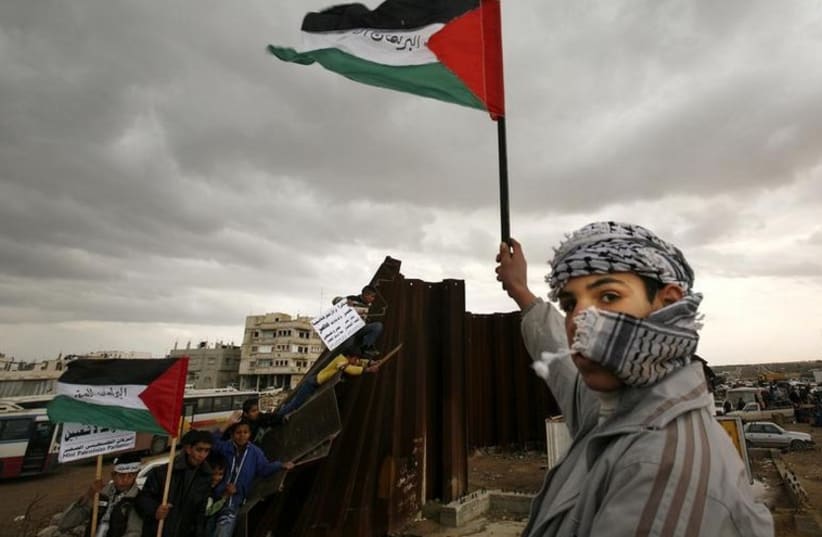
Rather than solve the Israeli-Palestinian conflict, the unilateral recognition of a Palestinian state will perpetuate it, Minister-without-Portfolio and National Unity MK Gideon Sa’ar said on Wednesday.
“This is not about establishing a Palestinian state within the framework of resolving the historical conflict with Israel,” Sa’ar said at Joint Perspectives, a cooperative conference hosted by WELT and The Jerusalem Post to discuss the challenges and obstacles that have arisen in the wake of the Oct. 7 massacre and the resulting war.
“This conflict will be solved only by direct negotiations. Rather, it’s a process where Palestinians won’t have to pay the price of compromise but will continue the conflict with Israel from an improved position of a state, which inherently undermines Israel’s ability to defend itself without them relinquishing any of their extreme demands: the return of ‘refugees’ and ‘Palestine – from the river to the sea.’ Such a move will perpetuate the conflict instead of resolving it,” Sa’ar said.
The full conference can be seen on JPost.com tonight, beginning at 7 p.m.

Opposed to a two-state solution
Sa’ar, who is a member of Israel’s National Security Cabinet, said he was opposed to a two-state solution in general because “a Palestinian state will be a Hamas state that will destabilize the region and continue, alongside its extreme Islamist partners, efforts to achieve their goal: the destruction of Israel.”
Sa’ar’s remarks came in the wake of reports that the US State Department and other countries were considering the unilateral recognition of a Palestinian state if Israel did not agree to enter negotiations over a two-state solution when the current fighting ceases.
In his speech, Sa’ar stressed the link between Hamas’s extreme Islamist ideology and the outbreak of antisemitism worldwide.
“It’s important to recognize the ideological sources of this murderous madness. According to Hamas, killing Jews is a religious command... According to Hamas’s charter, Jews were responsible for every negative historical event, including those in which they themselves were victims,” he said.
But the Palestinian Authority is no less antisemitic, Sa’ar argued.
“The Palestinian Authority is a major center of institutionalized antisemitism, which also thrives in its educational system. And its leader, Mahmoud Abbas, has time and again voiced classic antisemitic expressions.
“Today, it is abundantly clear that the new antisemitism is against the state of the Jewish people. Classical antisemitism delegitimized and dehumanized Jews. The new antisemitism does the very same thing to their state. The calling card of today’s antisemitism is the delegitimization of Israel and the denial of its right to self-defense,” Sa’ar said.
The current war is a “multi-front jihadist onslaught” that is “military, ideological, political, and legal combined.”
Sa’ar concluded by calling “on every leader, on every freedom-loving nation and person: Exert all political pressure to help release the 134 hostages who are still held in Gaza in an inhumane manner.
Go to the full article >>Israel says it approves Starlink services in Gaza field hospital
The Communications Ministry also said that Starlink -- Elon Musk's satellite network and the world's largest satellite operator -- will be enabled in Israel for the first time.

The Israeli government said on Wednesday it has approved the use of Starlink satellite services in an Emirati field hospital in Rafah in the war-battered Gaza Strip and in Israel for the first time.
"The Israeli security authorities approved the provision of Starlink services at the UAE's field hospital operating in Rafah," the Communications Ministry said in a statement.
"Starlink low-latency, high-speed connections will enable video conferencing with other hospitals and real-time remote diagnostics," it said.
The Communications Ministry also said that Starlink -- the satellite network of billionaire entrepreneur Elon Musk and the world's largest satellite operator -- will be enabled in Israel for the first time. "The use of the company's services will be limited at first with broader use expected in the future."
Musk appreciates Israel's move
Musk said in a posting on his social media platform X that he greatly appreciated Israel's move, saying he hoped it would help both Israelis and Palestinian civilians in Gaza.
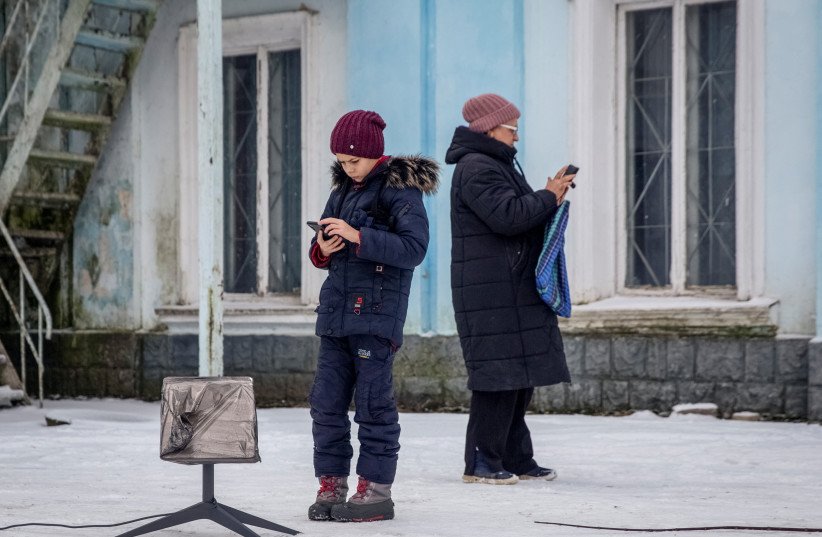
More than 28,000 people have been killed and 68,000 injured in Gaza during Israel's retaliatory military campaign against the militant Palestinian group Hamas that runs the enclave following its deadly cross-border attack into southern Israel on October 7, when it killed 1,200 people and took 253 hostages.
Most of Gaza's hospitals have been shut, with some of them directly hit by shelling or raided, and those still functioning are under growing pressure as Israeli troops push closer.
Israel says Hamas uses such medical facilities as cover for military purposes. Israel is facing growing international pressure to hold off on a planned assault on Rafah, the last refuge for displaced Palestinians in southern Gaza.
Go to the full article >>War with Hamas dents Israel economy but strong rebound seen afterwards
Consumer confidence stands at levels not seen since the COVID-19 pandemic in 2020, while the annual inflation rate has eased back down to 3%.
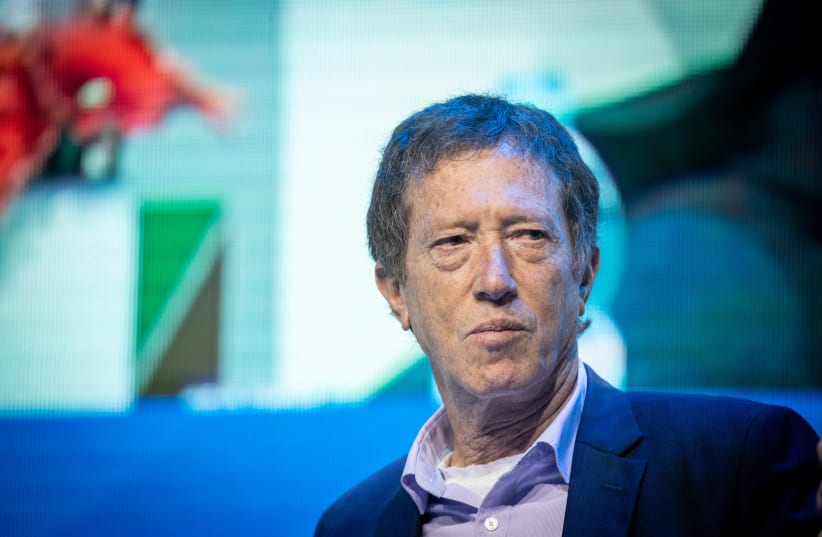
Israel's economy is taking a hit after more than four months of war with Hamas, but the economy looks set to grow slightly this year before rebounding in 2025 as long as the conflict stays contained to Gaza.
Israel's $500 billion economy had been humming along and was expected to grow around 3.5% last year, but after gunmen from Palestinian terrorist group Hamas attacked on October 7, the economy came to a standstill. Israelis stopped spending and travelling, hundreds of thousands were called up into reserve military duty in one of the largest troop mobilizations Israel has ever seen and thousands of Palestinian workers were laid off.
Preliminary data on economic activity in the fourth quarter are due on Monday at 1 pm (1100 GMT) and economists expect a double digit contraction due to declines in consumer spending, investment in areas such as construction - where half of building sites are idle since the government has not yet allowed the return of Palestinian workers - and in service exports.
Consumer confidence stands at levels not seen since the COVID-19 pandemic in 2020, while the annual inflation rate has eased back down to 3%, prompting a Bank of Israel rate reduction of a quarter-point in January.
At the outset of the war, most private spending was just on essential goods like food, while Israelis were not in any mood to travel for leisure, or go to movies or shows.
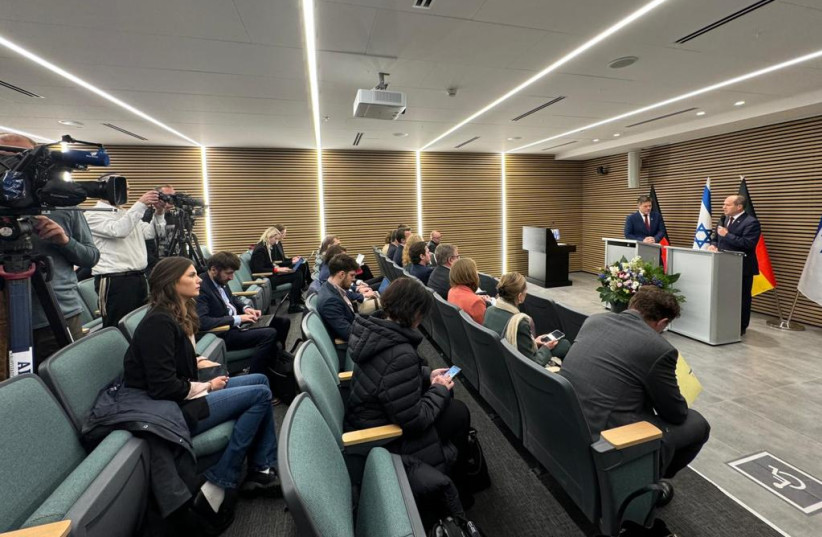
Now, even as fighting continues in Gaza, thousands of reservists have been sent home and crowds have returned to the shopping malls and restaurants that were shut down at the start of the war.
"It seems like the economy is coming back," said Bank Leumi chief economist Gil Bufman. He pointed to real-time data such as credit card purchases that indicate "demand is coming back" following a "terrible month" in October, before stabilizing in November and improving in December.
"The economy is resilient"
Economic growth in 2023 is estimated at around 2% with projections for 2024 between 0.5% and 2% - helped by high state spending - before expanding more rapidly in 2025.
The slowdown in 2023 that came amid a global downturn followed robust post-pandemic economic growth of 9.3% in 2021 and 6.5% in 2022. The expansion was led by the high-tech sector that accounts for 17% of economic output, 12% of jobs and 56% of exports.
"We did not encounter a fundamental problem in the economy. To the contrary. The economy is resilient," Avi Simhon, Prime Minister Benjamin Netanyahu's chief economic adviser, told Reuters. He cited stronger than expected tax income in January that helped lead to a monthly budget surplus.
Ratings agency Moody's last week downgraded Israel's credit rating to A2 from A1 due to elevated political risks and weaker public finances stemming from the war. But, it noted, the economy itself "has managed the fall-out from the conflict reasonably well," with some indicators pointing to a swift rebound and the labor force is approaching pre-war levels.
It cautioned, though, that should the conflict spread to include Hezbollah in Lebanon - where both sides trade cross-border fire daily - the "negative economic impact would spread to more sectors and be longer-lasting."
If the war remains contained, and ends soon, a sharp rebound is forecast for 2025. Bufman sees a 5.5% expansion while the central bank projects 5%.
"The Israeli economy is rooted on strong and healthy economic fundamentals, and is a world leader in the fields of innovation and technology," said Bank of Israel Governor Amir Yaron this week.
He said economic rebounds had followed the Palestinian uprising in the early 2000s, the second Lebanon war in 2006 and conflicts with Hamas militants in Gaza in 2008, 2012, 2014 and 2021.
This, Leumi's Bufman said, is because growth drivers remain - including rapid population growth of 2% a year, Israel's natural gas production, high levels of research and development and a highly skilled workforce able to work from home and bolster the services sector.
"We went through a very difficult period in the fourth quarter with all the things that happened, but it does seem like things are coming back," Bufman said.
Go to the full article >>Macron tells Netanyahu of his opposition to possible Israel offensive in Rafah
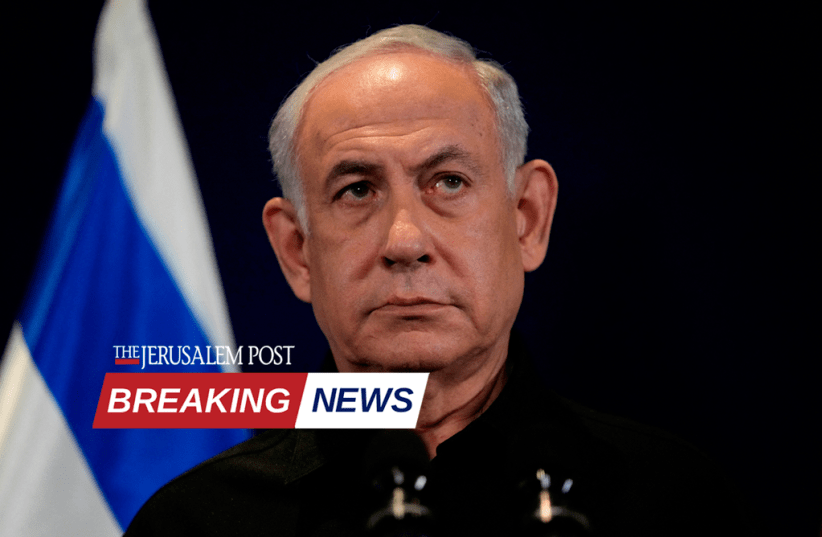
French President Emmanuel Macron's office said in a statement that Macron, in a phone call with Israeli Prime Minister Benjamin Netanyahu, had expressed his firm opposition to a possible Israeli military offensive in Rafah, southern Gaza.
"This could only lead to a humanitarian catastrophe of a new magnitude and to forced displacement of populations, which would constitute violations of international human rights and bring additional risk of regional escalation," it said.
Go to the full article >>UK wants 'absolute guarantee' of no repeat of UNWRA allegations, says Cameron

Britain wants an "absolute guarantee" that the UN Palestinian refugee agency (UNWRA) will not employ staff who are willing to attack Israel, Foreign Secretary David Cameron said on Wednesday, after allegations that some were involved in the October 7 violence.
Britain last month joined the United States in "temporarily pausing" funding for UNWRA following allegations that around 12 of its thousands of Palestinian employees were suspected of involvement in the Hamas attack that triggered the Gaza war.
Donors such as Britain and the United States have indicated they will not resume support until the UN's internal investigation into the allegations ends. A preliminary report is due to be published in the next several weeks.
Asked what Britain needed to see in the report in order to resume funding, Cameron said: "What we're looking for is an absolute guarantee that this can't happen again. Let's be clear here that it looks as if there were people working for UNWRA who took part in the October 7 attacks on Israel. That is unacceptable."
"That's why we paused our funding. That's why these reviews are taking place," he told reporters during a trip to Bulgaria. "We need them to take place quickly because many UNWRA staff do an absolutely vital job inside Gaza, where they are the only network for distributing aid, to make sure that we get aid to people that need it very, very badly."
Go to the full article >>Israel-Hamas War: What you need to know
- Hamas launched a massive attack on October 7, with thousands of terrorists infiltrating from the Gaza border and taking some 240 hostages into Gaza
- Over 1,200 Israelis and foreign nationals were murdered, including over 350 in the Re'im music festival and hundreds of Israeli civilians across Gaza border communities
- 134 hostages remain in Gaza, IDF says